China, let me write it off?
Now it’s more interesting than ever in the world: countries rush into each other with sanctions and restrictions, the world order loses its unipolarity and acquires a new form of Bipolar. More interesting is that another bear has entered the geopolitical arena - the big Chinese panda. Of course, the Western and Russian media no-no, but they will tell you that this is not an economic miracle at all, and in general the Chinese economy is such a bubble that is about to ... But it is about to last and last, because, first , the bubble is provided with technologies and goods, which means that it is difficult to burst, and secondly, it is really a miracle - for some 50 years (for history and economics it is not enough) to pull the country out of starving and miserable poverty into an export and investment attractive country . This is the time to ask for a master class. After all, there really is something to learn.
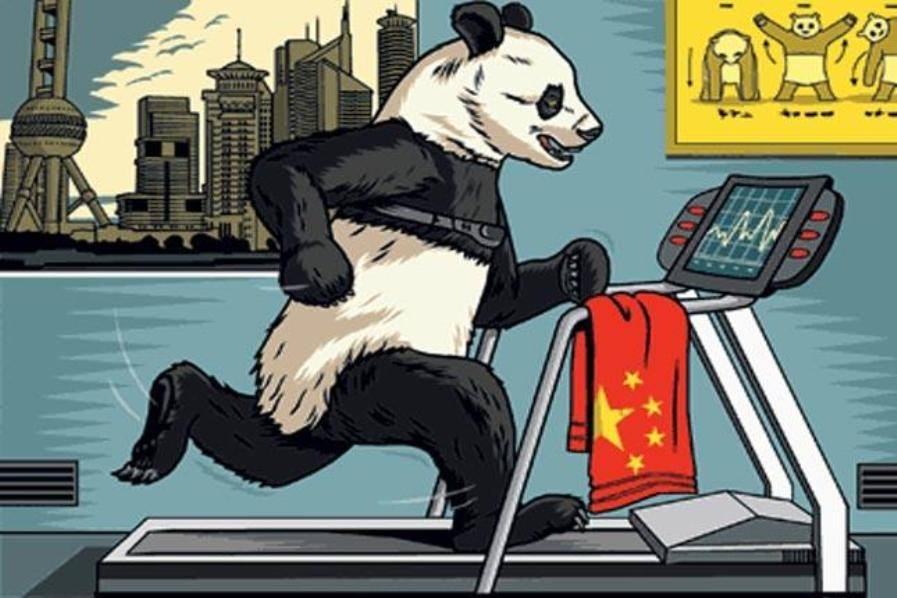
In 2014, the IMF calculated that the Chinese economy in terms of dollars overtook the US. A little more than a decade earlier, in 2003, China came in third place in terms of R & D expenditures (15 billion euros). And none of us was surprised - in 2014, most of us already had Chinese smartphones, stopped shuddering about the “Made in China” label on equipment and clothing, and actively carried packages with the necessary electronics for work, home and hobbies, in the process cursing the mail. Indeed, the growth rates of the Chinese economy are known to the whole world, But half a century ago, things were quite different - China did not fall, it lay, pinned down by the cult of personality and the communist ideology copied from the USSR, but perverted.
“Well, they would not have risen - they drive all garbage with a surcharge around the world, the margin is huge, sales are stable, online shopping is at its best, what else is needed!” - a simple man in the street comments on China’s growth. But not to write on Habré that China today produces everything: from cheap trinkets and imitations to cars (we love Lifan), serious equipment, weapons, energy-chemical products, etc. Increasingly, we encounter unusual and productive examples of Chinese transport, infrastructure organizations, and even environmental solutions (in China, this is really a matter of the first vital need).
')
By the way, from the IT giants a striking example of a breakthrough in international markets is Lenovo, which in 2005 became the third largest PC supplier in the world after HP and Dell. And, of course, Xiaomi, which aggressively manufactures, develops, buys other companies and aims to win.
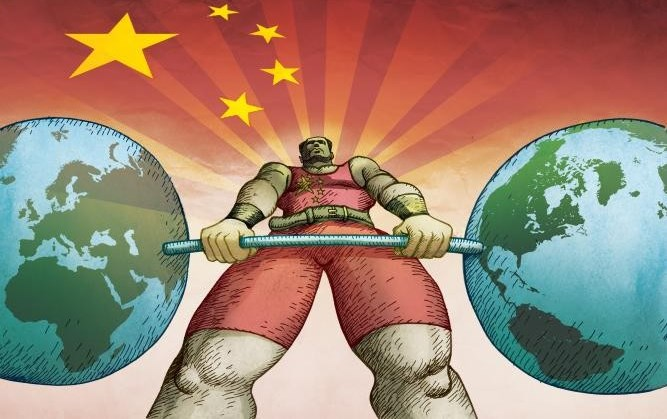
Since 1978, China has received a certain attractiveness for foreign capital, largely due to cheap labor and the low level of legislative regulation of employment. However, hard-working uncles Liao, even in the presence of international corporations, will not leave. The Chinese economy needed intensive growth with state support. And growth has happened.
If the starting point of the new China can be very conditionally considered the death of Comrade Mao, then with the person who began the modern history of the Middle Kingdom, everything is obvious - this is Deng Xiaoping, who came to power after a rather difficult path in his native country. The first thing he did was to allow the growth of market relations, an unprecedented business in a communist country. Of course, he was criticized for renouncing the ideas of socialism and adherence to capitalism, but he retorted with a saying: “It doesn’t matter whether a black cat or a white cat, the main thing is that it catches mice well”. And China needed the mice, that is, the money — after many years of building communism, a cultural revolution and a big leap, the people were in poverty. Dan was against poverty.
Deng Xiaoping proclaimed the modernization of four key sectors: science, manufacturing, agriculture and the army. All of this even today (especially today) seems very logical: a country should be able to feed itself, protect itself and a country should have something to trade with the world in order to receive currency, jobs and other benefits.
So, Dan opened China to the world and opened himself as a leader - he met with the heads of foreign countries in order to agree on important collaborations for China. Where is the investor going? The investor goes where the means of production is cheaper, the tax regime is more profitable and, most importantly, where there are less risks and problems: bureaucratic, legislative, economic, social. That is, conditionally in China, an investor could (and can) be sure that he would not be rolled, thrown, drank or taken from the market. And the investment flowed over the Chinese wall. The first to raise its head was light industry, having formed an export - the currency came that the authorities of the Middle Kingdom used to modernize enterprises and replace obsolete and outdated machines and machine tools.
Deng Xiaoping ordered the creation of preferential economic zones for foreigners, activated the program for repatriates. At the same time, the state created all the conditions for small business, and this was vital. The fact is that what kind of policy you do not initiate, but to feed and employ hundreds of millions of people was not an easy task - different ways were needed than just subsidies or command methods of the economy. The laws of economics are such that if a small business is healthy, other spheres are gradually improving — it provides jobs and forms trade with competition and market-regulated prices. There is where to work, there is something to buy. Therefore, measures to support small businesses were another manifestation of the wisdom of Deng Xiaoping.
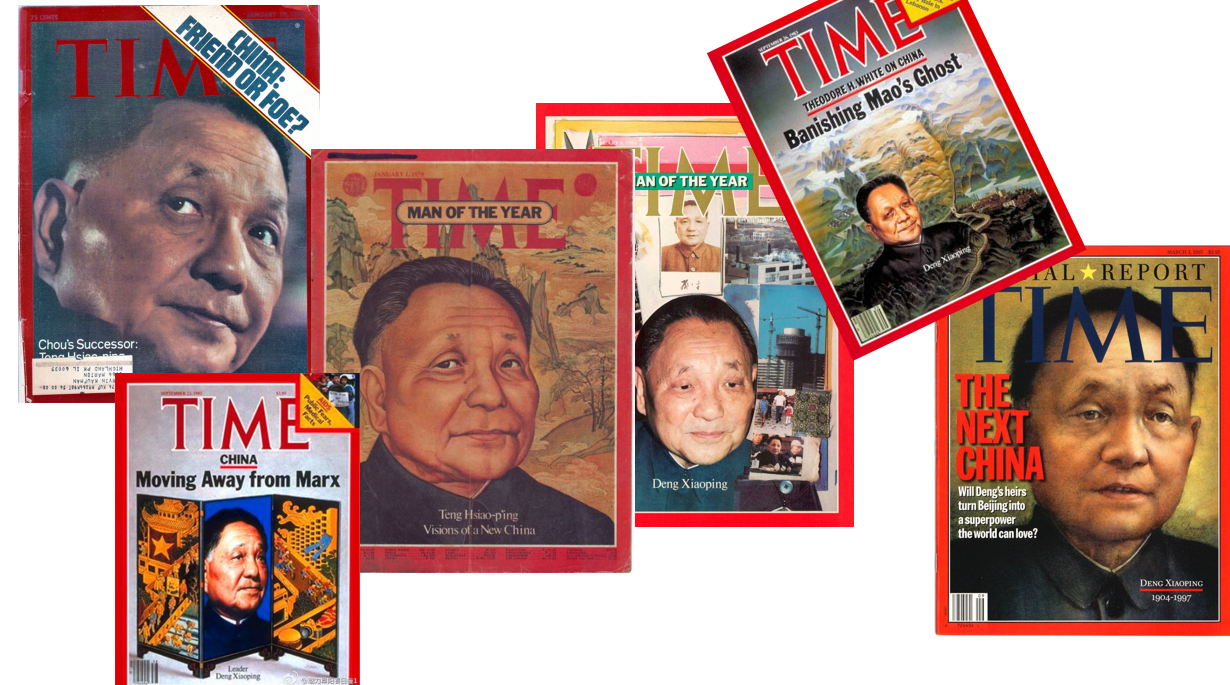
Deng Xiaoping in TIME magazine issues
In the late 80s, Deng Xiaoping gradually withdrew from power and official affairs, but remained the spiritual and ideological leader and began to observe the growth of the economy, which allowed today not only to sell mobile phones, but to develop a space program. create weapons, try to develop aircraft manufacturing (not yet 100% successful (and the automotive industry (and these guys are already seizing the automotive market)).
In the early 1990s, the policy of “technology in exchange for the Chinese market” was proclaimed. Manufacturers from other countries had the opportunity to trade in the Chinese market and expand their production in exchange for the disclosure of technology. The companies pondered and agreed - they began to manufacture products at a factory in China, sharply reducing the cost price and increasing the level of quality control. Naturally, research groups followed the means of production to China, development centers, promising laboratories, began to form. At the moment, in China there are cumulatively more than a hundred “special” IT and science and technology zones, including for foreigners (well, this is about how Skolkovo and Innopolis only works to the full extent).
Throughout this time, industrial development measures have been fueled by public investment.
Naturally, with the influx of foreign technology, the Chinese began to shamelessly copy cars, telephones, televisions, computers, etc. - from here and it turned out similar visually (and sometimes on the filling) model. However, China, again, did not become content with small things - scientists and engineers began to work on other people's technologies and make their own, improved and improved versions (Xiaomi and Meizu are the clearest example of this).
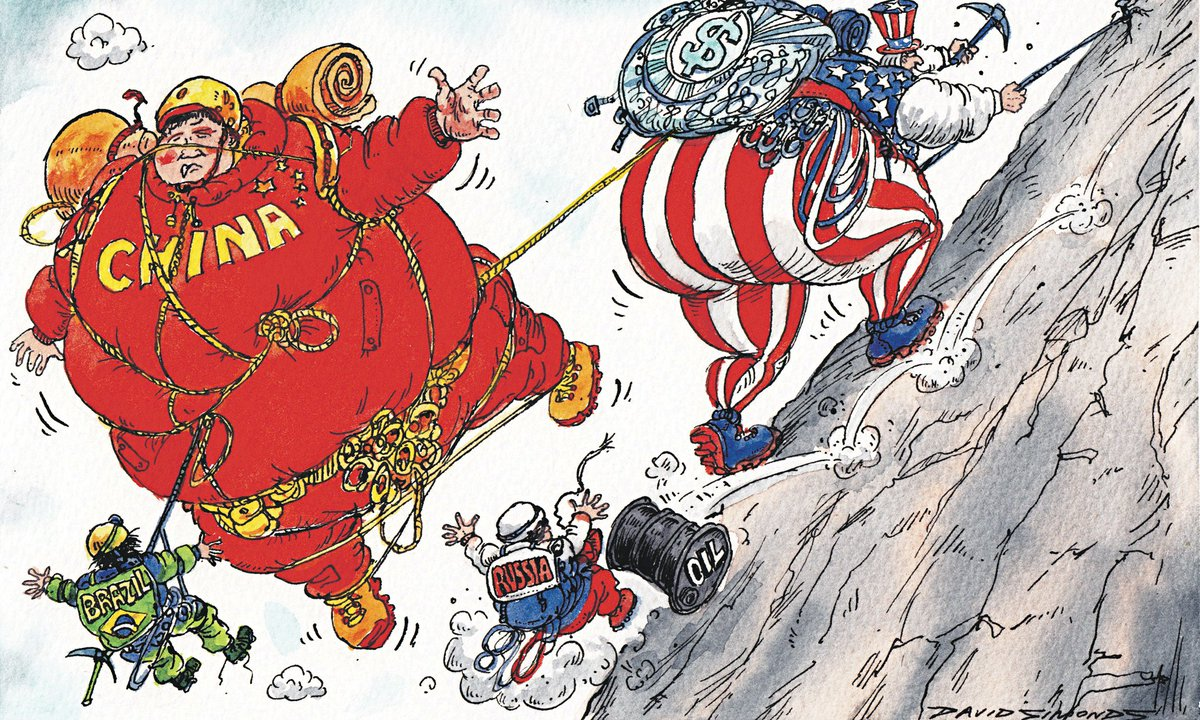
The main course of China today is the idea that it is science and technology that are the main productive force, so you need to invest in them to the maximum. And these are the factors that ensure China’s economic success.
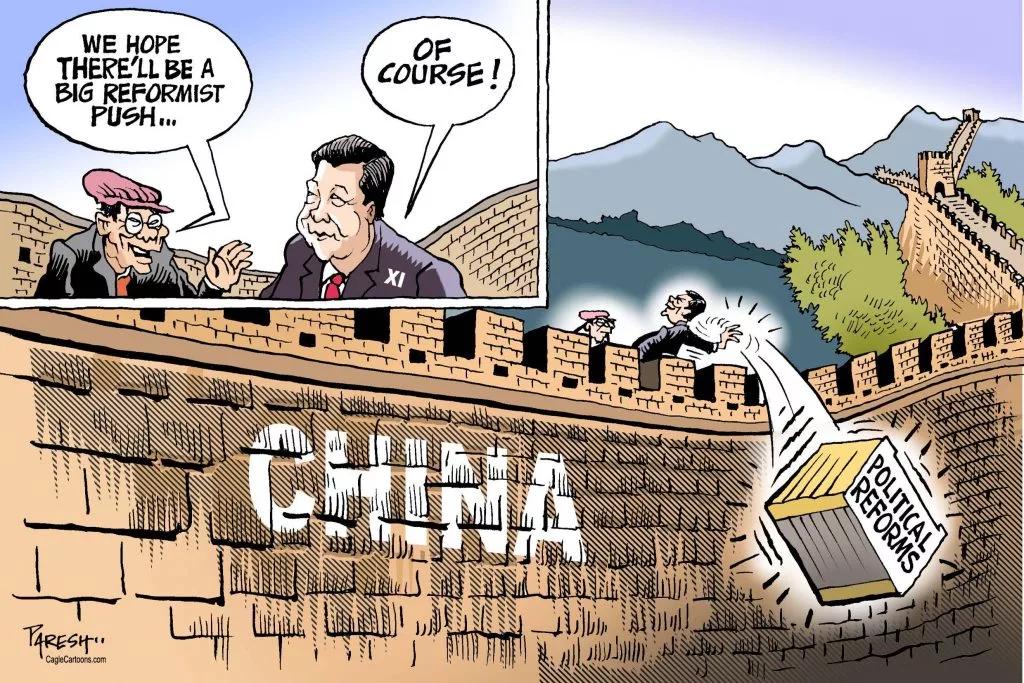
Under our first article about the economic miracle of China, one of the commentators wrote that he wanted to live in China. Of course, not everything is good there, as in any country: social problems, terrible traffic, terrible ecology in megalopolises, unemployment and not everywhere defeated poverty and the great Chinese firewall. Nobody managed to create a welfare state yet. And it is unlikely to succeed. But the difference in development and mentality will sooner or later determine the success of each country. So why not strive for the best?

Today it was supposed to happen on Habré!
Well, our business is small - we went over the wonders of Chinese industry and electronics and thought, but would we arrange an autumn sale? It is said - made from 3 to 10 September.
As always, not a tedious and useful list of discounts:
Read carefully (in a blog in English ) - there are also games with cool prizes!

In 2014, the IMF calculated that the Chinese economy in terms of dollars overtook the US. A little more than a decade earlier, in 2003, China came in third place in terms of R & D expenditures (15 billion euros). And none of us was surprised - in 2014, most of us already had Chinese smartphones, stopped shuddering about the “Made in China” label on equipment and clothing, and actively carried packages with the necessary electronics for work, home and hobbies, in the process cursing the mail. Indeed, the growth rates of the Chinese economy are known to the whole world, But half a century ago, things were quite different - China did not fall, it lay, pinned down by the cult of personality and the communist ideology copied from the USSR, but perverted.
“Well, they would not have risen - they drive all garbage with a surcharge around the world, the margin is huge, sales are stable, online shopping is at its best, what else is needed!” - a simple man in the street comments on China’s growth. But not to write on Habré that China today produces everything: from cheap trinkets and imitations to cars (we love Lifan), serious equipment, weapons, energy-chemical products, etc. Increasingly, we encounter unusual and productive examples of Chinese transport, infrastructure organizations, and even environmental solutions (in China, this is really a matter of the first vital need).
')
By the way, from the IT giants a striking example of a breakthrough in international markets is Lenovo, which in 2005 became the third largest PC supplier in the world after HP and Dell. And, of course, Xiaomi, which aggressively manufactures, develops, buys other companies and aims to win.

Since 1978, China has received a certain attractiveness for foreign capital, largely due to cheap labor and the low level of legislative regulation of employment. However, hard-working uncles Liao, even in the presence of international corporations, will not leave. The Chinese economy needed intensive growth with state support. And growth has happened.
Deng Xiaoping - the ideologist of technological breakthrough
If the starting point of the new China can be very conditionally considered the death of Comrade Mao, then with the person who began the modern history of the Middle Kingdom, everything is obvious - this is Deng Xiaoping, who came to power after a rather difficult path in his native country. The first thing he did was to allow the growth of market relations, an unprecedented business in a communist country. Of course, he was criticized for renouncing the ideas of socialism and adherence to capitalism, but he retorted with a saying: “It doesn’t matter whether a black cat or a white cat, the main thing is that it catches mice well”. And China needed the mice, that is, the money — after many years of building communism, a cultural revolution and a big leap, the people were in poverty. Dan was against poverty.
Deng Xiaoping proclaimed the modernization of four key sectors: science, manufacturing, agriculture and the army. All of this even today (especially today) seems very logical: a country should be able to feed itself, protect itself and a country should have something to trade with the world in order to receive currency, jobs and other benefits.
So, Dan opened China to the world and opened himself as a leader - he met with the heads of foreign countries in order to agree on important collaborations for China. Where is the investor going? The investor goes where the means of production is cheaper, the tax regime is more profitable and, most importantly, where there are less risks and problems: bureaucratic, legislative, economic, social. That is, conditionally in China, an investor could (and can) be sure that he would not be rolled, thrown, drank or taken from the market. And the investment flowed over the Chinese wall. The first to raise its head was light industry, having formed an export - the currency came that the authorities of the Middle Kingdom used to modernize enterprises and replace obsolete and outdated machines and machine tools.
Deng Xiaoping ordered the creation of preferential economic zones for foreigners, activated the program for repatriates. At the same time, the state created all the conditions for small business, and this was vital. The fact is that what kind of policy you do not initiate, but to feed and employ hundreds of millions of people was not an easy task - different ways were needed than just subsidies or command methods of the economy. The laws of economics are such that if a small business is healthy, other spheres are gradually improving — it provides jobs and forms trade with competition and market-regulated prices. There is where to work, there is something to buy. Therefore, measures to support small businesses were another manifestation of the wisdom of Deng Xiaoping.

Deng Xiaoping in TIME magazine issues
In the late 80s, Deng Xiaoping gradually withdrew from power and official affairs, but remained the spiritual and ideological leader and began to observe the growth of the economy, which allowed today not only to sell mobile phones, but to develop a space program. create weapons, try to develop aircraft manufacturing (not yet 100% successful (and the automotive industry (and these guys are already seizing the automotive market)).
In the early 1990s, the policy of “technology in exchange for the Chinese market” was proclaimed. Manufacturers from other countries had the opportunity to trade in the Chinese market and expand their production in exchange for the disclosure of technology. The companies pondered and agreed - they began to manufacture products at a factory in China, sharply reducing the cost price and increasing the level of quality control. Naturally, research groups followed the means of production to China, development centers, promising laboratories, began to form. At the moment, in China there are cumulatively more than a hundred “special” IT and science and technology zones, including for foreigners (well, this is about how Skolkovo and Innopolis only works to the full extent).
Throughout this time, industrial development measures have been fueled by public investment.
Naturally, with the influx of foreign technology, the Chinese began to shamelessly copy cars, telephones, televisions, computers, etc. - from here and it turned out similar visually (and sometimes on the filling) model. However, China, again, did not become content with small things - scientists and engineers began to work on other people's technologies and make their own, improved and improved versions (Xiaomi and Meizu are the clearest example of this).

What was important for such growth?
The main course of China today is the idea that it is science and technology that are the main productive force, so you need to invest in them to the maximum. And these are the factors that ensure China’s economic success.
- State support and public investment - the Chinese government has invested and continues to invest in small business, agriculture, and industrial modernization. Technology and innovation receive immense attention.
- A stable planning horizon for an investor is a venture coming to China, an investor, a business, etc. they can safely plan their activities for 10–20 years or more, since the economic system and all reforms occur primarily against the background of a stable political system. And we approach the director of your company, ask where the business will be in 10 years - the answer will not surprise you.
- The flow of foreign investments did not meet any obstacles - the state did not put up all sorts of obstacles, but on the contrary, created a favorable environment for foreign capital, formed economic zones. By the way, Western countries and the United States are not so happy to see Chinese investors and, if possible, oppose the purchase of domestic assets by investors from China (but they don’t really worry and, for example, actively invest in African resources).
- Severely punishable theft and corruption - of course, they are still there, and it is unlikely anyone will be able to eradicate these two phenomena to the end. However, such actions are punished very severely - up to the death penalty. Accordingly, a reduced level of corruption again contributes to the development of small business and does not repel players from around the world.
- Excellent training of scientific and engineering personnel - many schools and universities have opened in China since the mid-70s of the 20th century, academic science is flourishing, patent law is developing. Higher education is one of the key values of the urban population of the country; many trained personnel graduate from universities (there are more than 23 million students in China).
- China’s domestic policy is specific, but it is capable of providing investors and companies with a large planning horizon: economic and structural reforms are constantly taking place, the country's position on the world stage is changing, but the existing socialism and autocracy guarantee political and social stability. A great example of using authoritarian tools in a peaceful way.

- The wise monetary policy of the Chinese government - the government allows the yuan to become cheaper (which stimulates exports and makes Chinese goods more competitive), does not hold back the currency corridor. At the same time, financial institutions are large domestic investors.
- The wise international policy of China - the country does not enter into open confrontation with world powers, it acts reconciled and cautiously. China has strong neighbors and is learning to use each of them in its geopolitical interests, without taking its side.
- Preferences for export companies - if a Chinese company produces goods for export, then it has maximum tax, customs, credit benefits. Moreover, all these preferences may also have industries if they are export-oriented.
Under our first article about the economic miracle of China, one of the commentators wrote that he wanted to live in China. Of course, not everything is good there, as in any country: social problems, terrible traffic, terrible ecology in megalopolises, unemployment and not everywhere defeated poverty and the great Chinese firewall. Nobody managed to create a welfare state yet. And it is unlikely to succeed. But the difference in development and mentality will sooner or later determine the success of each country. So why not strive for the best?
I'll turn the calendar - and the sale of September ...

Today it was supposed to happen on Habré!
Well, our business is small - we went over the wonders of Chinese industry and electronics and thought, but would we arrange an autumn sale? It is said - made from 3 to 10 September.
As always, not a tedious and useful list of discounts:
- Coupon promotion home page
- Russian page promotion
- Electronics - wearable and stationary, all sorts of quadcopters, smartphones, watches and many Xiaomi
- Gadgets for life, health and entertainment: home appliances, adored cats, vacuum cleaning robots, drones, scooters and segways
- Gikam are not walking naked: some clothes, lots of suitcases, watches and backpacks. By the way, there are cosmetic brushes for girls, they are always a joy (if you need an uncomplicated surprise gift).
- Choose 3 items and pay for all three at once one amount - $ 9.99, $ 29.99 or $ 99.99. There is not every trifle, but the necessary things, for example, lamps, flashlights, cycle computers, etc.
- Secret small things
Read carefully (in a blog in English ) - there are also games with cool prizes!
Source: https://habr.com/ru/post/422201/
All Articles